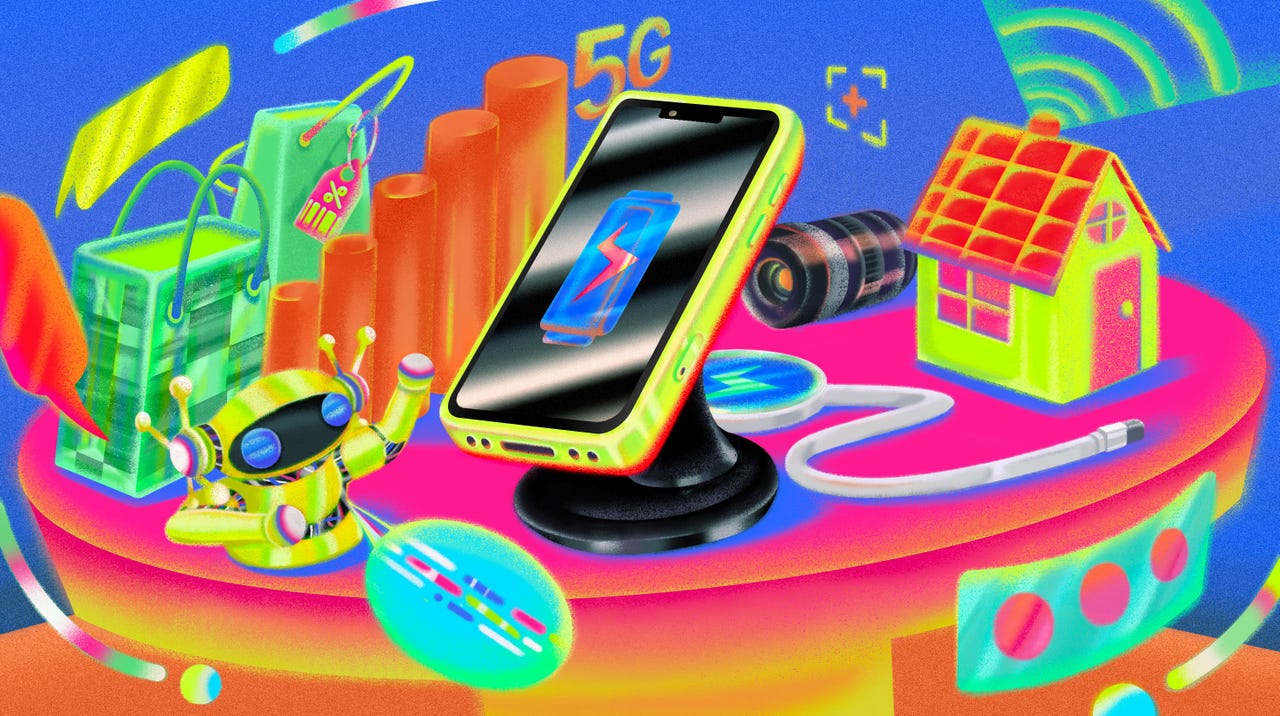
Revolutionary Bike Ride: How Photo-Adaptive Lenses and Cutting-Edge Display Technology Changed the Game

Cutting-Edge Trends in Mobility: How On-Device AI and Revolutionary Smartphones Are Shaping the Future

Chiara Xie/ZDNET
The ever-evolving, rapidly changing landscape of mobile technology means that what’s bleeding edge today could become an obsolete vintage piece tomorrow. But looking at 2024 from the lenses of industry analysts, subject-matter experts, and annual trends offers a broader, more nuanced picture.
Disclaimer: This post includes affiliate links
If you click on a link and make a purchase, I may receive a commission at no extra cost to you.
SPECIAL FEATURE
This year, five topics will likely dominate the headlines, dictate the next industry buzzwords, and be in the minds of every consumer. You’ll hear a lot more about the “AI PC “, but don’t let that name obscure the reality: Our smartphones – the most personal of computers – are also receptive to an artificial intelligence makeover.
And that’s just the beginning, as you’ll find more notable trends in the list below, all of which have already begun to take shape.
1. On-device AI puts the ‘smart’ in smartphone
The new Samsung Galaxy S24 series features a live translation feature, powered by on-device AI.
June Wan/ZDNET
This year, generative AI features will be integrated with smartphones, and in a big way. From real-time, multi-language translation for better communication to summarizing hours of voice memos to enhancing the way our smartphone cameras gather and process light for photos and videos, we’re already seeing how the mishmash of AI and mobile computing can coalesce.
Samsung’s just-released Galaxy S24 smartphones , for example, all feature generative AI tools that leverage on-device processing and cloud-based servers to help users fulfill general, day-to-day tasks more reliably. Such features are powered by the company’s first for-consumer AI model, Galaxy AI , which runs atop Google’s Gemini and Imagen 2. “We expect over 1 billion Generative AI smartphones to be shipped cumulatively between 2024 and 2027,” says Ritesh Bendre, global content manager at Counterpoint Research.
Also: Apple research reveals some dazzling AI tech could be headed to your iPhone
Qualcomm is playing a major role here as well, with its flagship Snapdragon 8 Gen 3 chipset enabling performance gains across the board on smartphones, from a 20% improvement in CPU, 30% in GPU, and 41% in NPU – the latter of which is critical for devices to perform generative AI tasks in a power-efficient manner. Expect more flagship Android phones this year – as well as VR and XR headsets -- to field Qualcomm’s new processor, with plenty of AI-enabled capabilities in tow.
2. Foldables are getting better (and cheaper)
The Motorola Razr 2023 was the most affordable foldable phone last year, selling for as low as $499.
June Wan/ZDNET
Arguably, 2023 was the year of the foldable, with just about every major manufacturer (except Apple) joining the fray with a shape-shifting handset of its own. Google kicked things off with the Pixel Fold , followed by Motorola’s Razr comeback and Samsung’s Galaxy Z series . To close things out, OnePlus debuted the Open, a $1,699 phone-to-tablet handset that undercut its closest competition.
Now that the major players have entered the competition, the big question this year is: How much more accessible will foldable devices become? Avi Greengart, president and lead analyst at Techsponential , tells ZDNET that as long as consumers are satisfied with the level of performance and high-tech components that they’re paying for, there likely won’t be a downtrend in pricing anytime soon.
Also: Why foldable phones are still so expensive, according to analysts
“Foldable products have a structure that is inevitably expensive compared to general bar types, even in terms of display alone,” adds Jene Park, senior analyst at Counterpoint Research.
But there’s hope. Carrier providers, who often discount the latest devices aggressively in exchange for customer loyalty (read: agreement to long-term installment plans), remain a primary source of US smartphone sales. Motorola’s standard Razr model , which can be purchased for as low as $499 at the time of writing, is another sign of good things to come. With that in mind, 2024 is looking to be a promising sequel to foldables’ breakout year in 2023.
3. Qi2 bridges a long-standing gap in charging
The iPhone 15 Pro (left) next to the Samsung Galaxy S23 Ultra (right).
June Wan/ZDNET
The Wireless Power Consortium (WPC), a committee that consists of Apple, Samsung, and Google, has been pushing for the standardization of Qi2 wireless charging for more than a year, and 2024 may be the year these efforts come to fruition. The second generation of Qi charging promises improved magnetic coils for more efficient and faster wireless power delivery (up to 15W), both for iOS and Android devices.
Also: iOS 17.2 will add next-gen Qi2 wireless charging support to iPhone 13 and 14
“Qi2’s perfect alignment improves energy efficiency by reducing the energy loss that can happen when the phone or the charger is not aligned. Just as important, Qi2 will greatly reduce the landfill waste associated with wired charger replacement due to plugs breaking and the stress placed on cords from daily connecting and disconnecting,” said Paul Struhsaker, executive director of WPC, in a statement last year.
The adoption of such technology bridges a longstanding gap between MagSafe-compatible devices (iPhone 12 and up) and ones without the feature, allowing Android users to also reap the benefits of magnet-based charging accessories . Accessory makers like Anker and Satechi have already begun rolling out Qi2-compatible docks and charging pads. Now, it’s on phone manufacturers to foot the second half of the bill by integrating the proper coils on the back of their devices. Expect those to arrive very soon.
Also: The best wireless chargers for iPhone and Android phones
4. Periscope lenses push cameras to further distances
The iPhone 15 Pro Max features Apple’s first true telephoto lens, which the company calls “Tetraprism”.
Jason Hiner/ZDNET
Periscope lenses have existed on smartphones for some time, but over the past year (and very likely in 2024), we’re seeing manufacturers put an even stronger focus on creating the best far-distance cameras.
A periscope camera is composed of a prism, used for magnifying and refracting light, and a vertically aligned lens that’s enclosed within the phone. With it, smartphone cameras can capture subjects at a further distance optically and not through a digital zoom that would otherwise result in a loss in detail and sharpness.
Also: The iPhone 16 Ultra camera will integrate the biggest leap in photos since B&W-to-color: report
Companies like Samsung have long adopted periscope lenses to improve their camera performance, and the most recent Galaxy S24 Ultra model is a prime example. While the device has a 200-megapixel main lens, it’s the 50MP telephoto lens, capable of 5x optical zoom, that users will rely on the most when taking pictures from far away. Chinese phone maker Oppo also just released the Find X7 Ultra , which features not one but two periscope lenses.
As manufacturers continue to figure out ways to shrink and fit better components within the framework of smartphones, expect better, more capable cameras in 2024 and beyond.
Also: The evolution of smartphone cameras: From megapixels to AI-driven photography
5. A new class of mobile devices
The Rabbit R1 debuted at CES 2024, featuring a design inspired by classic Tamagotchi toys.
June Wan/ZDNET
In the most intriguing trend of 2024, mobile devices are now being served in form factors that challenge conventional design norms. I experienced one myself just a week ago at CES , when AI startup Rabbit Inc. demoed its R1 pocket device . The R1, made in partnership with design firm Teenage Engineering, is likely one of many mobile gadgets to come in 2024 that make you question the look and feel of your existing smartphone.
Also: Rabbit sells 10,000 of its R1 AI pocket companions in one day
Humane is another rising player in the non-traditional mobile device category, with an AI Pin that latches onto your clothing – not your pocket. Like the Rabbit R1, the Pin favors AI agents over human interaction with apps, meaning instead of having the user tap and scroll through app interfaces, the device utilizes various AI models to communicate with the services.
If an app-less future is on the horizon, expect devices such as the Rabbit R1 and Humane AI Pin to lead the way.
Smartphones
The best phones for 2024: Expert tested
I’m a diehard Pixel user, but I’m considering a change for two reasons (and I’m not alone)
I love this iPhone case’s physical keyboard, but that isn’t even its best feature
The best VPNs for iPhone and iPad: Expert tested
- The best phones for 2024: Expert tested
- I’m a diehard Pixel user, but I’m considering a change for two reasons (and I’m not alone)
- I love this iPhone case’s physical keyboard, but that isn’t even its best feature
- The best VPNs for iPhone and iPad: Expert tested
Newsletters
ZDNET Tech Today
ZDNET’s Tech Today newsletter is a daily briefing of the newest, most talked about stories, five days a week.
Subscribe
Also read:
- [New] 2024 Approved Virtual Vice-Versa 10 Alternative Action Games
- 2024 Approved Capture Chuckles Quickly Efficient Methods for Exciting YouTube Reaction Videos (3 Tips)
- 2024 Approved Customize Your Video's Appeal YouTube Thumbnail Tips & Tricks
- Deactivated Your Insta? Discover How to Revive It in Minutes!
- How To Activate and Use Life360 Ghost Mode On Oppo A2 | Dr.fone
- How To Increase FPS [2024 Useful Tips]
- Retrace Mechanic Setup for 2024
- Solve Your Xbox Series Gaming Earphones Issues with These Simple Steps
- Ultimate Tutorial: How to Screen Record or Screenshot on PS4
- Unlock the Power of Instagram Hashtags for More Followers and Likes!
- Ways to stop parent tracking your OnePlus 12R | Dr.fone
- Title: Revolutionary Bike Ride: How Photo-Adaptive Lenses and Cutting-Edge Display Technology Changed the Game
- Author: John
- Created at : 2025-03-01 16:40:27
- Updated at : 2025-03-02 22:16:01
- Link: https://techno-recovery.techidaily.com/revolutionary-bike-ride-how-photo-adaptive-lenses-and-cutting-edge-display-technology-changed-the-game/
- License: This work is licensed under CC BY-NC-SA 4.0.